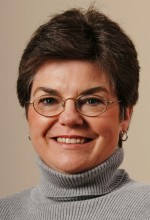The first thing I noticed when I visited the Islamic Center of Omaha was that it resembled any place of worship in any American neighborhood.
The parking lot, behind a chain-link fence, is small and parking presents a challenge on Fridays, the Muslim holy day.
The center’s website states that certain infractions on the narrow streets will result in towing, and that includes parking in the imam’s reserved spot. Apparently those “clergy only” signs aren’t just at Catholic parishes. Bulletin boards in the foyer were loaded with fliers, and cookies and dates greeted the open house guests. Little kids darted underfoot. A quote from Omar Khayyam greets the visitor: Do not let the behavior of others destroy your inner peace.
The behavior of others was actually what drew me here. During the past several months, the Islamic Center of Omaha has been vandalized three times. Fortunately, although a door was badly damaged once, no one has been able to break into the building. Surveillance cameras reveal heavily masked culprits and no arrests have been made.
[hotblock]
Since rhetoric against Muslims has been so extreme during our current political climate, I wondered how that was affecting my Muslim neighbors. So I wrote to ask for an interview. I had received no response when a few days later I saw a notice for an open house, which later I learned is held monthly.
Fortunately, the first person who greeted me was Mohammed Rasheed, the president of the mosque, so we sat down to chat in the small worship area that is the mosque. This room is used by men; women pray in an adjacent room.
It struck me how much my knowledge of Islam is influenced by popular culture. I asked about prayer rugs, which I’ve seen on film, and with a smile Rasheed told me that no one brings a prayer rug because the rectangles on the attractive Persian-like carpet served that purpose.
Omaha’s Islamic center opened 25 years ago, as many international students came for graduate studies at Omaha universities and gradually sunk roots in the community. It serves a veritable United Nations of worshippers. Omaha’s Muslims come from places as diverse as Indonesia and the Philippines.
About 350 to 400 people worship regularly at the center. The imam, Mohamed AbouTaleb, whom I did not meet, is from Egypt and was educated at Al-Azhar University, one of the leading Islamic learning centers in the world.
Along with other world religions, Islam is a religion of peace. After terrorist events, like the recent atrocities in Paris, Omaha’s Islamic center issues press releases condemning the violence, using quotes from the Quran. Most Islamic organizations worldwide do likewise, although often they’re not publicized and we hear indignant refrains of, “Why aren’t good Muslims condemning this?”
That’s frustrating to people like Rasheed. It also causes apprehension within the community. The center has many evening family activities, and when a San Bernardino mosque was fire-bombed after the recent killings, it caused fear.
The open house presentation ran long, so it was interrupted for prayer, one of five daily periods. We heard the call to prayer, and saw a small group of men bow to the floor. The frequent refrain, “Allahu akbar” reverberated — a lovely phrase meaning God is greater, but one which, thanks to terrorists and television, has taken on a sinister meaning in the Western world.
A visitor was greeted with applause by the over 100 guests when she said, “Many of us are here to show support and solidarity. We’d like to know how we can help.”
PREVIOUS: New opportunities for religious to teach in urban schools as part of formation process
NEXT: Offer kindness and mercy in a troubled world




Share this story